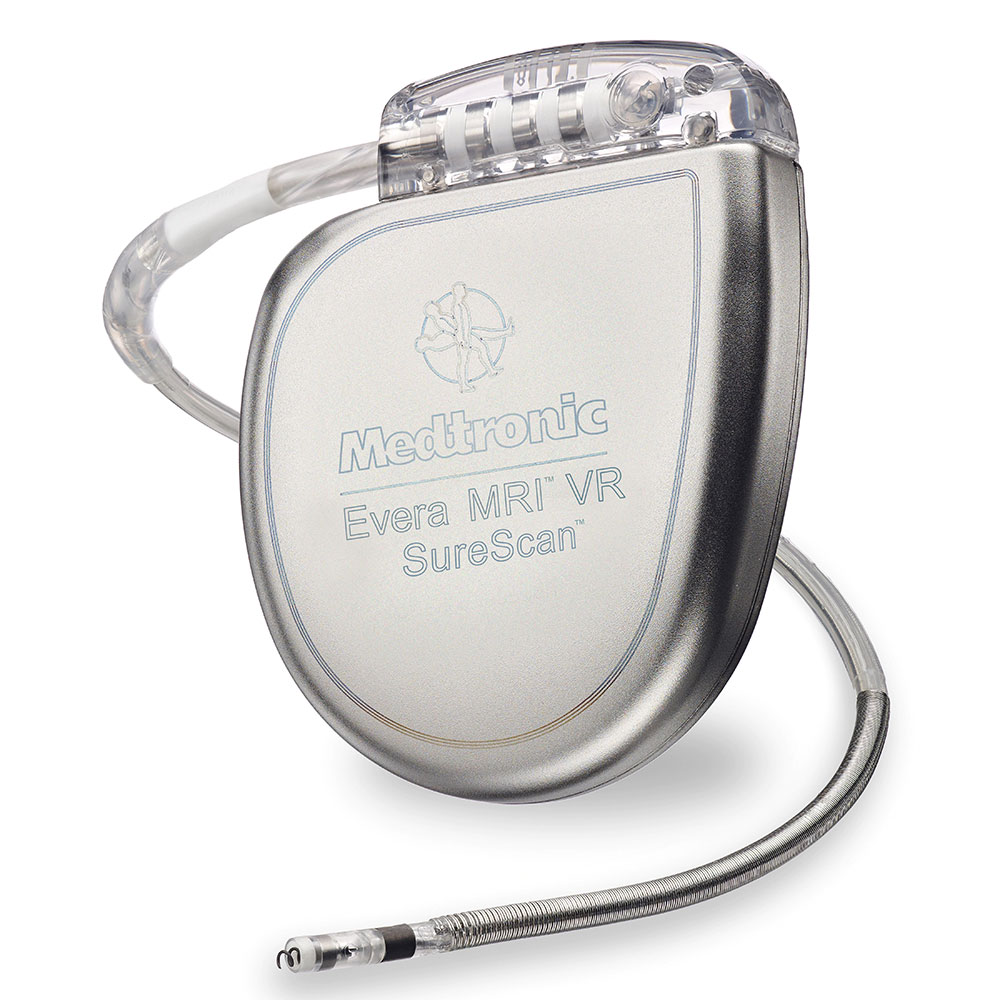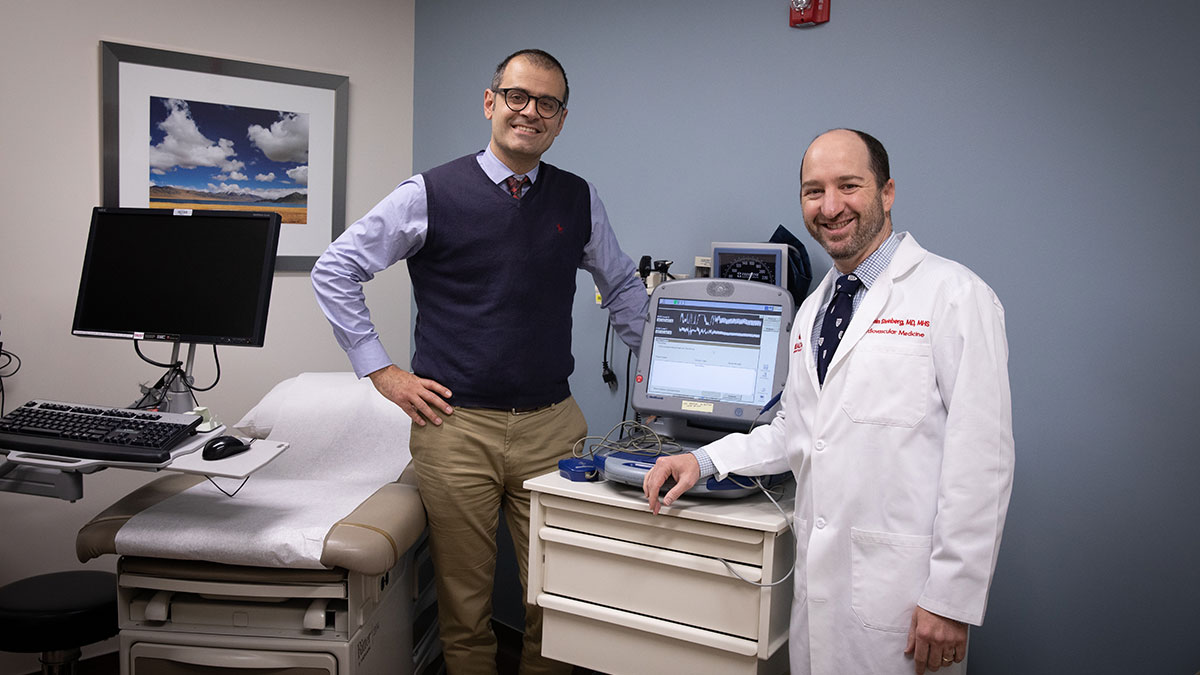In this high-tech era, wearable devices such as smartwatches have proven to be invaluable companions for the health conscious. But a new study from the University of Utah shows that for a small group of people, some of these electronic fitness gadgets could possibly be risky to their health — even potentially deadly.
U electrical and computer engineering assistant professor Benjamin Sanchez Terrones and U associate professor of medicine Benjamin Steinberg have published a new study that shows wearable devices such as the Samsung Galaxy watch 4, Fitbit smart scales, or Moodmetric smart rings, among others, have sensing technology that could interfere with cardiac implantable electronic devices (CIEDs) such as pacemakers, implantable cardioverter defibrillators (ICDs), and cardiac resynchronization therapy (CRT) devices.

PHOTO CREDIT: Photo courtesy of Medtronic
A new study from the University of Utah shows that wearable devices such as certain smartwatches and smart scales might possibly interfere with implantable devices like the implantable cardioverter defibrillator shown here.
Download Full-Res Image“This study raises a red flag,” said Sanchez Terrones. “We have done this work in simulations and benchtop testing following Food and Drug Administration accepted guidelines, and these gadgets interfere with the correct functioning of the CIEDs we tested. These results call for future clinical studies evaluating the translation of our findings to patients wearing CIEDs and using these wearable devices.”
Their study was published in the newest edition of the scientific journal, Heart Rhythm. The paper, authored by U electrical and computer engineering graduate student Gia-Bao Ha, Sanchez Terrones, Steinberg, U internal medicine professor Roger Freedman, and Universitat Autònoma de Barcelona cardiology professor Antoni Bayés-Genís, can be read here.
At issue are specific wearable smartwatches, at-home smart scales, and smart rings that utilize bioimpedance, a type of sensing technology that emits a very small, imperceptible current of electricity (measured in microamps) into the body. For smartwatches like the Samsung Galaxy Watch 4 or the Fitbit Aria 2 smart scale, the electrical current flows through the body and the response is measured by the sensor to determine the person’s body composition such as skeletal muscle mass or fat mass. For smart rings like the Moodmetric smart ring, bioimpedance sensing technology is used to measure a person’s level of stress.
But after conducting comprehensive testing of bioimpedance on three cardiac CRT devices from manufacturers Medtronic, Boston Scientific, and Abbott, Sanchez Terrones’ team learned the slight electrical currents from these wearable gadgets can interfere and sometimes confuse cardiac implantable devices into operating incorrectly.
In the case of a pacemaker, which sends small electrical impulses to the heart when it is beating too slowly, the bioimpedance’s tiny electrical current could trick the heart into thinking it is beating fast enough, preventing the pacemaker from doing its job when it is supposed to.

PHOTO CREDIT: Dan Hixson/U John and Marcia Price College of Engineering)
University of Utah electrical and computer engineering assistant professor Benjamin Sanchez Terrones, left, and U associate professor of medicine Benjamin Steinberg have published a new study that shows wearable devices such as the Samsung Galaxy watch 4, Fitbit smart scales, or Moodmetric smart rings, among others, have sensing technology that could interfere with cardiac implantable electronic devices (CIEDs) such as pacemakers, implantable cardioverter defibrillators (ICDs), and cardiac resynchronization therapy (CRT) devices.
Download Full-Res Image“We have patients who depend on pacemakers to live,” Steinberg, a cardiac electrophysiologist, said. “If the pacemaker gets confused by interference, it could stop working during the duration that it is confused. If that interference is for a prolonged time, the patient could pass out or worse.”
For other types of medical devices such as implantable cardioverter-defibrillators, which not only act as a pacemaker but can also shock the heart to restore a regular heart rhythm, a wearable device with bioimpedance could trick the defibrillator into delivering the patient an unneeded electric shock, which can be painful.
Nearly all if not all implantable cardiac devices already warn patients about the potential for interference with a variety of electronics due to magnetic fields, such as carrying a mobile phone in your breast pocket near a pacemaker. But Sanchez-Terrones said this is the first time a study has discovered problems associated with a gadget’s bioimpedance sensing technology.
“The scientific community doesn’t know about this,” he said. “No one has looked at whether this is a real concern or not.”
Sanchez Terrones and Steinberg emphasize that the research does not convey an immediate or clear risk to patients who use these kinds of wearable devices, but they believe it’s a first step for further study.
“We need to test across a broader cohort of devices and possibly in patients with these devices,” Steinberg said.
“Ultimately, more studies are needed to evaluate the clinical translation of our findings and ensure the health of our patients,” Sanchez Terrones added.
